
The Complaint Tablet of Ea-Nasir, Ur, 1750 BCE, object no. 1953,0411.71, © The Trustees of the British Museum, CC BY-NC-SA 4.0 license.
There are millions of objects in the collections of the British Museum, thousands of which are on display at any one time. All are of interest to someone, but only a few dozen, perhaps, have achieved worldwide fame.
Among those objects are some of the greatest treasures of the world’s collective heritage – the Rosetta Stone, the Lewis Chessmen, the Portland Vase, and the remnants of the Mausoleum of Halikarnassos, to name but a few. In recent years, a far humbler contender for world fame has risen to unlikely stardom – a simple clay tablet, one of hundreds in the museum’s collection.
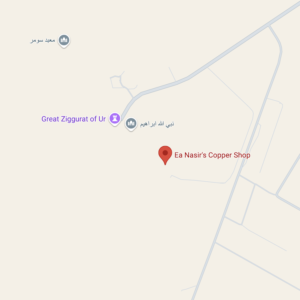
Location of Ea-Nasir’s Copper Shop on Google Maps. See reviews online.
British Museum object no. 1953,0411.71, better known as “The Complaint Tablet of Ea-Nasir,” is a clay tablet about the size of an old-school cell phone. It comes from the city of Ur, and dates to 1750 BCE. The tablet was excavated from a site in Iraq in 1953 by Sir Leonard Woolley and entered the museum’s collection in the same year.
The tablet was then of interest primarily to experts in Babylonian history and legible only to those capable of deciphering its cuneiform inscription, as a full translation is not available in the museum’s collection database. No one could have predicted that it would one day become the most celebrated object in the museum’s collection – at least, in certain corners of the internet.
The tablet first came to the attention of someone outside the academic community in 2015, when a photograph of it in its case in the British Museum was posted to Reddit with the caption “1750 BC problems” – the image was cross-posted to Tumblr the same day. Both posts quickly accrued interest, and one reader soon tracked down and shared a translation of the tablet, from Letters from Mesopotamia: Official, Business, and Private Letters on Clay Tablets from Two Millenia, by A. Leo Oppenheim.
Tell Ea-nasir: Nanni sends the following message:
When you came, you said to me as follows: “I will give Gimil-Sin (when he comes) fine quality copper ingots.” You left then but you did not do what you promised me. You put ingots which were not good before my messenger (Sit-Sin) and said: “If you want to take them, take them; if you do not want to take them, go away!”
What do you take me for, that you treat somebody like me with such contempt? I have sent as messengers gentlemen like ourselves to collect the bag with my money (deposited with you) but you have treated me with contempt by sending them back to me empty-handed several times, and that through enemy territory. Is there anyone among the merchants who trade with Telmun who has treated me in this way? You alone treat my messenger with contempt! On account of that one (trifling) mina of silver which I owe(?) you, you feel free to speak in such a way, while I have given to the palace on your behalf 1,080 pounds of copper, and umi-abum has likewise given 1,080 pounds of copper, apart from what we both have had written on a sealed tablet to be kept in the temple of Samas.
How have you treated me for that copper? You have withheld my money bag from me in enemy territory; it is now up to you to restore (my money) to me in full.
Take cognizance that (from now on) I will not accept here any copper from you that is not of fine quality. I shall (from now on) select and take the ingots individually in my own yard, and I shall exercise against you my right of rejection because you have treated me with contempt.
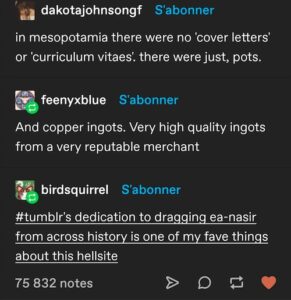
Ea-Nasir review from Tumblr.
Over the next nine years, jokes and riffs on the affronted would-be copper buyer, on the unscrupulous and unapologetic Ea-Nasir, on the messengers sent back empty-handed, and on the not-so “fine quality” copper ingots, exploded across the internet. Tumblr in particular, a site designed to encourage sharing content across blogs, and where nonsense posts and niche jokes frequently rocket into unlikely prominence, became a haven of Ea-Nasir-inspired comedy.
This being the internet, examples are innumerable, both because of their actual quantity and because, like most social media platforms, Tumblr’s search function operates extremely poorly. Here are just a few:
Other social media sites, of course, have their own takes on the joke:
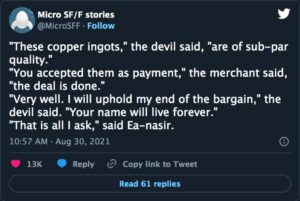
Twitter copper ingot tale.
The approximate find-site of the tablet in Iraq now has a place label in Google Maps. “Ea-Nasir’s Copper Shop” has a 3.5 star rating and several bad reviews written in cuneiform.

thedaywasnew TikTok baker @etymologynerd
A dedicated culinary expert and scholar, TikTok baker @etymologynerd, even recreated the tablet in gingerbread form on video.
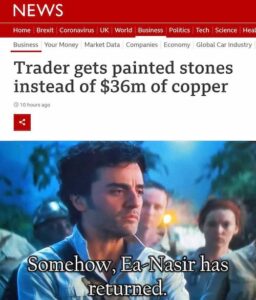
Tumblr. Return of Ea-Nasir.
Jokes about Ea-Nasir’s wrongdoing resurged in 2021, when news broke of a Turkish firm, Bietsan Bakir, which had contracted to sell 10,000 tons of copper, but sent their client containers full of paving stones coated in a thin layer of copper paint instead. Like Nanni, the buyer, Mercuria Energy Trading, had already paid for the copper, and was forced to sue to get their money back – certainly a less terrifying project than crossing through enemy territory multiple times, but probably even more time-consuming.
The best-known internet humorist to address the woes of Nanni was Randall Munroe, creator of the widely read and long-running webcomic xkcd. The 2021 copper kerfuffle was featured in xkcd comic #2758:
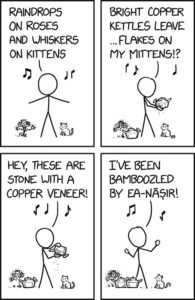
Randall Munroe, xkcd comic #2758. Creative Commons Attribution-NonCommercial 2.5 License. https://xkcd.com/license.html
In one way, it is unsurprising that so many people could relate to and find humor in the predicament of a Sumerian man thousands of years ago. This may be among the earliest scams ever recorded, but even then, it was certainly not the first. And there is some comfort in remembering that. We are living in an era when unsavory business practices of many forms are becoming normal, even expected.
Subscription services trap customers trying to cancel their accounts in online labyrinths, inhabited by unhelpful AI bots less deadly but more irritating than the Minotaur. Social media apps track our every move across the internet, then sell that data to any advertiser that wants it. Unwary Amazon shoppers report having been sold chairs meant for dollhouses, when they thought they were buying real ones. Phone games targeted at children inveigle them into spending hundreds of dollars on in-game purchases. Everyone from movie stars to presidential candidates can use their fame to hawk their own lines of tequila, sneakers, or skin care, of wildly varying quality.
What could be less relevant to our lives today than a nearly 4,000 year old clay tablet?
What could speak to us out of the past so vividly, so relatably, and so delightfully?
What could be more familiar to any of us than Nanni’s frustration and Ea-Nasir’s unrepentant glee?
All of the participants in this mercantile drama are alive to us today, captured in Nanni’s eloquent and expressive language – we can see them all, Nanni furiously pressing his message into the clay, his harried messengers, like so many modern personal assistants, hurrying back and forth across enemy territory, Ea-Nasir, seated on his heap of ingots-which-were-not-good, and laughing at his customer’s frustration.
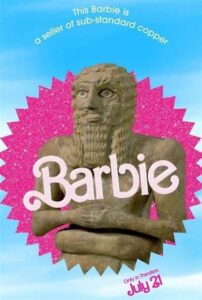
Barbie Ea-Nasir, reddit.
History repeats itself, we know, a maxim that usually inspires a feeling of fatalism when applied to the struggles between nations, the vast movements of people and the continual resurgence of war. The history of ordinary people, however, provides a comforting counterpart. They were just like us, we think, when we look at a monk’s manuscript marked by a cat’s inky paws, a Roman tombstone for a beloved dog, or a tablet recording a Sumerian merchant’s bad customer feedback.
That is the gift that museums, especially museum of antiquities, give – they teach us our own immortality, by demonstrating the continuity of human nature through all ages and all civilizations. The things, people, and pets we love may not last, but the ways that we love them survive and are renewed in every generation.
Unfortunately, so are the ways that we get scammed by cheapskates and complain about it afterwards. We can only hope that Nanni was able to laugh, a little ruefully, about his experience, and today, we are laughing with him.
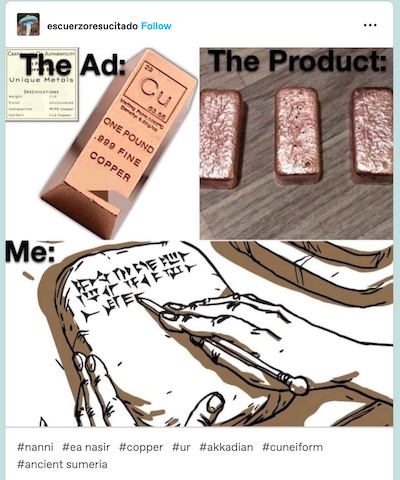 Tumblr: Ea-Nasir, the Ad, the Product, Me. By escuerzoresucitado.
Tumblr: Ea-Nasir, the Ad, the Product, Me. By escuerzoresucitado. 

